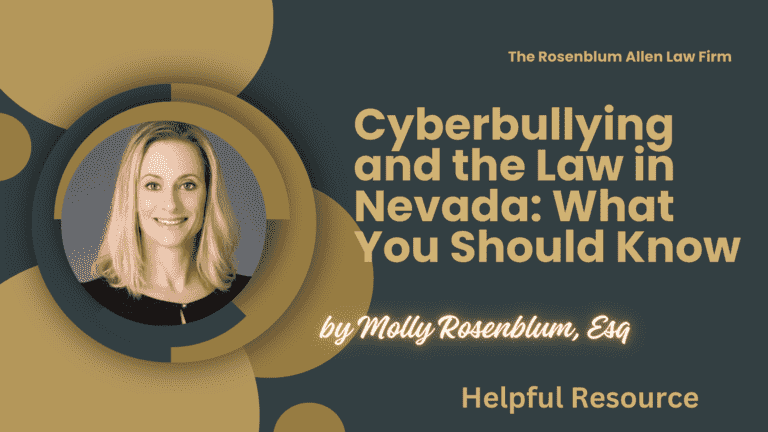Cyberbullying is the use of digital technologies such as social media, messaging apps, or websites to harass, threaten, intimidate, or humiliate someone. Unlike traditional bullying, cyberbullying can occur 24/7 and spread rapidly online, making it particularly harmful.
 While prevention is crucial, there may be instances where individuals find themselves facing cyberbullying charges in Nevada. This article focuses on strategies on cyberbullying laws Nevada to defend against such charges, understanding the legal process, and potential defenses available.
While prevention is crucial, there may be instances where individuals find themselves facing cyberbullying charges in Nevada. This article focuses on strategies on cyberbullying laws Nevada to defend against such charges, understanding the legal process, and potential defenses available.
Cyberbullying Laws Nevada: Understanding the Charges
In Nevada, cyberbullying is classified as a misdemeanor, punishable by up to 6 months in jail and a $1,000 fine. The law covers electronic communication used to harass, threaten, intimidate, or humiliate someone, applying to both minors and adults.
Legal Process Overview
- Investigation
- Arrest and booking (if applicable)
- Arraignment
- Pre-trial conferences
- Possible plea bargaining
- Trial (if necessary)
- Sentencing (if found guilty)
Potential Defenses
Lack of Intent: Demonstrate that the alleged actions were not intended to harm or intimidate.
Freedom of Speech: Argue that the communication was protected under the First Amendment.
Mistaken Identity: Show that someone else used the accused’s account or device.
Consent or Mutual Exchange: Prove that the alleged victim willingly participated in the communication.
Insufficient Evidence: Challenge the prosecution’s evidence as inadequate to prove guilt beyond reasonable doubt.
Mental Health Issues: In some cases, mental health conditions may be relevant to the defense.
Lack of Knowledge: Argue that the accused was unaware their actions constituted cyberbullying.

Building a Strong Defense
Preserve all relevant digital evidence, including messages, posts, and account logs.
Gather character witnesses who can attest to the accused’s behavior and reputation.
Document any prior interactions with the alleged victim to establish context.
Consider hiring a digital forensics expert to analyze electronic evidence.
Explore possible motives for false accusations, if applicable.
Legal Representation
Securing an experienced criminal defense attorney familiar with cyberbullying laws Nevada is crucial. They can:
- Navigate the legal system
- Negotiate with prosecutors
- Develop an effective defense strategy
- Protect the accused’s rights throughout the process

Mitigating Factors
If guilt is established, consider factors that may reduce sentencing:
- First-time offense
- Willingness to participate in counseling or education programs
- Genuine remorse and efforts to make amends
- Age and maturity level of the accused
Alternative Resolutions
In some cases, alternative resolutions may be possible:
- Diversion programs
- Mediation between parties
- Community service in lieu of harsher penalties
Long-term Considerations
Even if charges are dismissed or the accused is found not guilty, the experience can have lasting impacts:
- Reputation damage
- School or employment consequences
- Emotional stress
It’s important to seek counseling or support services to address these issues.

Breaking It All Down for You
Cyberbullying is a serious issue with significant legal and personal consequences. By understanding the laws, implementing prevention strategies, and providing support to those affected, we can work towards creating a safer online environment for everyone in Nevada.

Frequently Asked Questions
I've been accused of cyberbullying. What should I do?
If you’re accused of cyberbullying, don’t panic. Seek advice from a criminal defense attorney promptly. They’ll guide you on legal strategies and represent you if charges are filed. Be honest with your attorney and avoid contacting the accuser further. Keep evidence supporting your innocence. Refrain from discussing the situation online. Cooperate with law enforcement but only with your lawyer present. Admitting fault or contacting the accuser could worsen the situation.
What are the penalties if I'm convicted of cyberbullying in Nevada?
Conviction could lead to up to 6 months in jail and fines up to $1,000. Felony charges such as stalking or extortion carry sentences of 1-5 years imprisonment. Civil lawsuits may result in damages ranging from $10,000 to $300,000. Penalties escalate for repeat offenders.
Will I have a criminal record if convicted of cyberbullying?
Yes, a conviction remains on your permanent criminal record, affecting college admissions, employment checks, and more. Expungement may be possible after several years.
Should I accept a plea bargain or go to trial if charged?
Your attorney will advise based on evidence. Plea bargains may lessen penalties but require admitting guilt. Trials contest charges but risk harsher punishment if guilty. Consider your options carefully with counsel.
How can I prevent issues like this in the future?
Avoid online harassment, threats, or defamation, even as jokes. Think before posting, apologize if harm is caused, and seek counseling if struggling with online behavior. Model kindness and compassion on social media.
Additional Resources for You

Molly Rosenblum, Esq., our lead attorney, has gone beyond providing exemplary legal representation by creating a wealth of resources for those facing criminal charges. These resources, available on the Rosenblum Law website, are specifically designed to assist individuals in understanding their rights, the legal processes involved, and how to navigate the complexities of criminal defense in various areas. Here’s a brief overview of the resources created by Molly Rosenblum, Esq., to support you during challenging times:
Criminal Defense Attorneys: A comprehensive guide to criminal defense services offered, addressing a wide range of charges. Explore the guide.
Las Vegas DUI Lawyer: Specialized assistance for those facing DUI charges in Las Vegas, offering strategies for defense and information on DUI laws. Learn more.
Domestic Violence Lawyer Las Vegas: Effective legal support for individuals accused of domestic violence, with insights into defense strategies and legal implications. Get support.
Drug Possession Lawyer: Guidance for those charged with drug possession, including legal advice on how to navigate the charges and potential defenses. Read about drug possession defense.
Sex Crimes Attorney: Specialized resources for individuals accused of sex crimes, offering critical advice on defense strategies and the legal process. Discover how to defend against sex crime charges.
Misdemeanor Lawyer: Legal advice and strategies for dealing with misdemeanor charges, helping to minimize the impact of these charges on one’s life. Explore misdemeanor defense.
Juvenile Defense Lawyers: Dedicated resources for defending minors facing criminal charges, emphasizing the unique aspects of juvenile law. Learn about juvenile defense.
Las Vegas Warrant Defense Attorney: Guidance for individuals with outstanding warrants, offering advice on how to resolve warrants and avoid arrest. Read about warrant defense.
Las Vegas Probation Violation Attorney: Support for those accused of violating probation, with strategies to address the violation and mitigate consequences. Learn about probation violation defense.
Theft Crime Defense Lawyer: Expertise in defending against theft charges, providing insight into potential defenses and legal strategies. Explore theft crime defense.
Kidnapping Lawyers: Specialized legal support for those accused of kidnapping, focusing on defense strategies and the complexities of kidnapping charges. Understand kidnapping defense.
Firearms Lawyer Las Vegas: Legal resources for individuals facing firearms charges, offering advice on gun laws and defense strategies. Read about firearms defense.
Through these meticulously developed resources, Molly Rosenblum, Esq., aims to empower individuals facing criminal charges with the knowledge and tools needed for a robust defense. We encourage you to utilize these resources to ensure your rights are protected and to navigate the criminal justice system more effectively.

Offsite Resources You May Find Helpful
Here are several recommended offsite resources related to cyberbullying in Nevada:
Cyberbullying Research Center – https://cyberbullying.org/
Leading organization studying nature, consequences, and prevention of cyberbullying.
American Bar Association – https://www.americanbar.org/
National association providing public legal education and attorney directories.
National Crime Prevention Council – https://www.ncpc.org/
Provides education on cyberbullying prevention and internet safety.
The Trevor Project – https://www.thetrevorproject.org/
Organization focused on suicide prevention and crisis support for LGBTQ youth.

A Special Message From Our Lead Attorney
Why You Might Need a Lawyer

Molly Rosenblum, Esq
Dear reader,
Thank you for taking the time to learn more about Nevada’s cyberbullying laws and resources. I hope you found this guide informative.
I’m an attorney passionate about protecting victims and stopping cyberbullying. I’m here to help. If you or a loved one are facing harassment or threats online, please know that you don’t have to endure this alone.
I offer free consultations to discuss your situation. I also offer consultations to discuss your legal options for taking action. Please don’t hesitate to call me at (702) 433-2889 to schedule a confidential appointment.
We can make the online world safer with compassion and commitment.
Sincerely,
Molly Rosenblum, Attorney at Law




